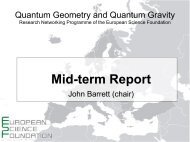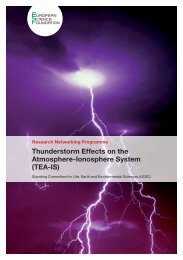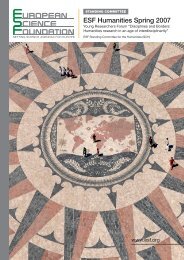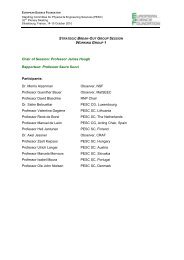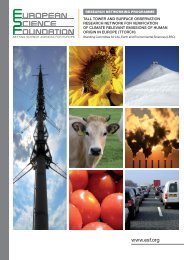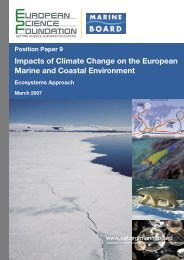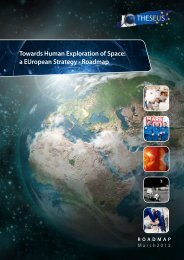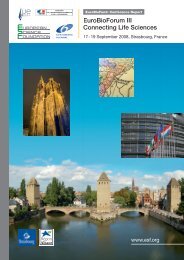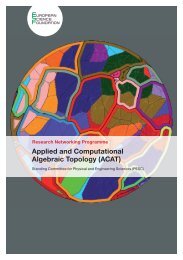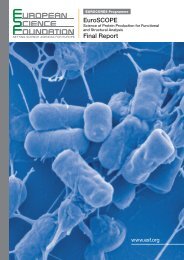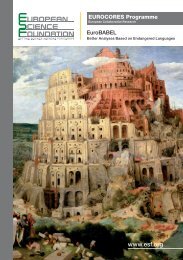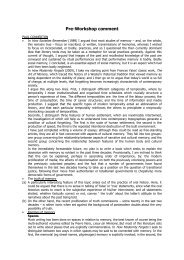The European Code of Conduct for Research Integrity
The European Code of Conduct for Research Integrity
The European Code of Conduct for Research Integrity
- No tags were found...
Create successful ePaper yourself
Turn your PDF publications into a flip-book with our unique Google optimized e-Paper software.
the collection, analysis and interpretation <strong>of</strong> data,and verifiability <strong>of</strong> the scientific reasoning.• Impartiality and independence from commissioningor interested parties, from ideological or politicalpressure groups, and from economic or financialinterests.• Open communication, in discussing the work withother scientists, in contributing to public knowledgethrough publication <strong>of</strong> the findings, in honestcommunication to the general public. This opennesspresupposes a proper storage and availability<strong>of</strong> data, and accessibility <strong>for</strong> interested colleagues.• Duty <strong>of</strong> care <strong>for</strong> participants in and the subjects <strong>of</strong>research, be they human beings, animals, the environmentor cultural objects. <strong>Research</strong> on humansubjects and animals should always rest on theprinciples <strong>of</strong> respect and duty <strong>of</strong> care.• Fairness, in providing proper references and givingdue credits to the work <strong>of</strong> others, in treating colleagueswith integrity and honesty.• Responsibility <strong>for</strong> future science generations. <strong>The</strong>education <strong>of</strong> young scientists and scholars requiresbinding standards <strong>for</strong> mentorship and supervision.2.2.4 <strong>Integrity</strong> in science and scholarship:misconductViolating these basic norms leads to researchmisconduct, which is the crux <strong>of</strong> inappropriatebehaviour in science. <strong>Research</strong> misconduct is damagingto science, because it may create false leads <strong>for</strong>other scientists or the results may not be replicable,resulting in a continuation <strong>of</strong> the deception. It isalso harmful to individuals and society: fraudulentresearch may result in the release and use <strong>of</strong> unsafedrugs, in the production <strong>of</strong> deficient products,inadequate instruments or erroneous procedures.Furthermore, if policy or legislation is based onthe results <strong>of</strong> fraudulent research, harmful consequencesare not inconceivable. But damage is alsodone through the subversion <strong>of</strong> the public’s trust inscience. <strong>The</strong> credibility <strong>of</strong> science would decline andtrust in science as a dependable source <strong>of</strong> in<strong>for</strong>mationand advice in respect <strong>of</strong> numerous decisions, soimportant <strong>for</strong> the welfare <strong>of</strong> mankind and society(environment, health, security, energy), would besubverted. This could lead to undesirable restrictionson permissible research, which could furtherdamage the pursuit <strong>of</strong> knowledge.<strong>The</strong>re is some empirical evidence4 that there isan increasing incidence <strong>of</strong> research misconduct.Pressure to publish, commercialisation, greater competition<strong>for</strong> funds, more opportunities <strong>for</strong> instancethrough the internet, evaluation practices, and thecurrent career system <strong>for</strong> scientists, may all contriuteto this un<strong>for</strong>tunate development.<strong>The</strong> two most serious violations <strong>of</strong> the ethos <strong>of</strong>science are fabrication and falsification. Fabricationis making up results and recording or reportingthem. Falsification is manipulating research processesor changing or omitting data. Fabricationand falsification can also arise in the reporting <strong>of</strong>other researcher’s results, in the reporting <strong>of</strong> expertopinion and in the public dissemination <strong>of</strong> science.A third category <strong>of</strong> misdemeanour is plagiarism inproposing, per<strong>for</strong>ming, or reviewing research, or inreporting research results. Plagiarism is the appropriation<strong>of</strong> another person’s ideas, research resultsor words without giving appropriate credit. <strong>The</strong> precisewording <strong>of</strong> an idea or explanation or illustrativematerial (such as original figures and photographs,as well as lengthy tables) in textbooks or popularmaterial are protected by copyright laws, but neverthelesscan be subject to plagiarism. Plagiarism is<strong>of</strong> a different order since it is supposed to be moreinjurious to fellow scientists than to science as such.However, we have seen that openness is one <strong>of</strong> thebasic integrity principles, and that progress in sciencedepends on communication and discussionamong fellow scientists and on a well functioningpeer-review system. And if scientists would hesitateor even refuse to practice this openness andcommunication <strong>for</strong> fear <strong>of</strong> not being recognised asdevisor or author the quality <strong>of</strong> science would sufferas well.Also improper dealing with such infringement <strong>of</strong>principles <strong>of</strong> integrity (attempts to cover up, reprisalsto whistle-blowers and violations <strong>of</strong> due process)can be classified as misconduct. In general it shouldbe underlined that research institutes, funders,academies, universities and other actors conductingand administering research have the duty to promotegood research management so that researchintegrity is instilled into the culture.It is generally accepted that the primary responsibility<strong>for</strong> handling cases <strong>of</strong> misconduct is in thehands <strong>of</strong> the employers <strong>of</strong> scientists doing research.Frequently this concerns the institute or universitywhere the accused researcher works. <strong>The</strong>se institutionsshould have a standing committee that dealswith misconduct, or establish an ad hoc committeein case a serious allegation is brought <strong>for</strong>ward.4. Reported by N. Steneck at the ESF-ORI first World Conference on<strong>Research</strong> <strong>Integrity</strong>, Fostering Responsible <strong>Research</strong>. Lisbon, Portugal,16-19 Sept., 2007. <strong>The</strong> same increase <strong>of</strong> misconduct was generallyobserved by <strong>European</strong> Academy Presidents in a survey conductedin 2007, and reported by P.J.D. Drenth (Strengths and weaknesses <strong>of</strong>current policies and practices) at the same Lisbon conference.11<strong>The</strong> <strong>European</strong> <strong>Code</strong> <strong>of</strong> <strong>Conduct</strong> <strong>for</strong> <strong>Research</strong> <strong>Integrity</strong>



